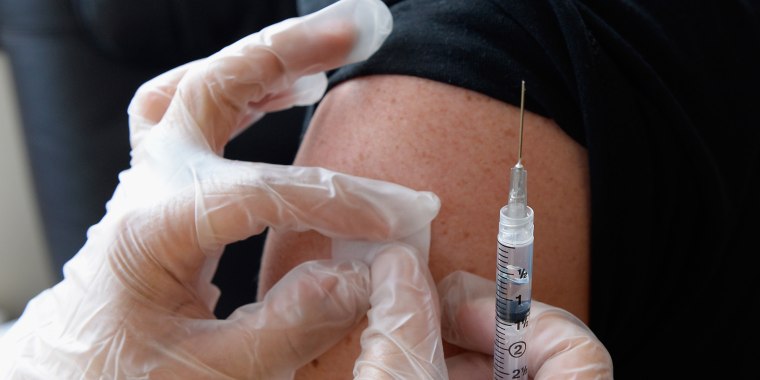As colleges continue to grapple with outbreaks of meningitis strain B on campus, a new survey finds few doctors are discussing the vaccine for the disease with their young patients and their parents.
Only 51 percent of pediatricians and 31 percent of family physicians reported initiating a conversation about the MenB vaccine during routine visits for 16-18 year olds — the preferred ages for the shot, the study published Monday in Pediatrics found. More than 900 doctors were surveyed for the paper.
“Not all physicians believe this should be routinely given since it is a rare disease and there is limited experience with the longevity and safety of the vaccines,” Dr. Allison Kempe, the lead author and professor of pediatrics at the University of Colorado School of Medicine, told TODAY. “Therefore not all will bring it up.”
Doctors working for an HMO were less likely to bring up the vaccine, while doctors aware of a MenB outbreak in their state or those who saw a teen for a pre-college visit (rather than a routine health check) were more likely to talk about it.
Primary care physicians have “significant gaps” in knowledge about MenB disease and the vaccine, the authors concluded. That may be concerning to parents sending their kids off to college this fall.
The Five College consortium in Massachusetts and Oregon State University are currently dealing with outbreaks of type B meningococcal disease, according to the Centers for Disease Control and Prevention.
Here’s what families need to know:
What is meningitis?
It’s an infection and inflammation in the fluids surrounding the brain and the spinal cord, said Dr. Christina Johns, senior medical adviser for PM Pediatrics. It can be caused by bacteria, viruses, fungi or other bugs.
“It can be extremely serious, as in fatal. So this is not something to mess around with,” Johns told TODAY. “But the good news is that with immunization, we are seeing less meningitis.”
Some 600–1,000 people now contract meningococcal disease in the U.S. each year, a historic low, and 10-15 percent of them die, according to the National Meningitis Association. Those who survive may have brain damage or need to have limbs amputated.
Teens and young adults are among those at greatest risk, with one-fifth of all cases involving patients 11–24 years old.
Why are colleges vulnerable to outbreaks?
Bacterial meningitis can spread among people who live in close spaces, so college dorms are a hotbed for potential infection transmission, Johns said. Students may spread the germs by coughing, kissing, sharing a drink or an e-cigarette, or using a communal bathroom.
The B strain is the most common cause of disease in adolescents, according to the National Meningitis Association, which noted outbreaks of type B meningococcal disease were reported on 20 college campuses from March 2013 to November 2017. The U.S. Food and Drug Administration approved the first vaccine against meningitis B in 2014.
If a student is fully vaccinated, it's safe to attend the school, Johns said.
What are the symptoms?
Fever and a stiff neck are the most common signs, Johns said.
“It means really a stiff neck — not just ‘I slept on it funny,’ but ‘It’s really hard for me to move my neck,’” she noted.
Vomiting, confusion, headache and sensitivity to light are the other common symptoms. Johns encouraged people to get checked out immediately if there is any suspicion of the disease. The infection can be overwhelming and cause organs to shut down, so early detection is crucial.
“When I see a child and they have fever, a stiff neck, vomiting and light sensitivity, right away I’m thinking to myself, OK, why would this person not have meningitis?” Johns noted.
After a diagnosis is confirmed, antibiotics are started immediately for bacterial meningitis. Viral meningitis is often less severe and typically requires supportive care.
What’s the guidance on vaccines?
All 11-12 year olds should be vaccinated with a single dose of a quadrivalent meningococcal conjugate vaccine, which protects against four strains of meningococcal disease: A, C, W, and Y, the CDC advises. Older teens need a second booster shot when they’re 16.
When it comes to the B strain, young people ages 16-23 may also be vaccinated with the MenB vaccine, preferably at 16 through 18 years old.
Bewildered? You’re not alone.
“A lot of people are confused,” Johns said. “I would encourage everybody to have a conversation with their child’s pediatrician about what is right for their child.” It’s wise and safe to get the MenB vaccine, she added.
If a doctor doesn’t bring up the shot, it’s entirely appropriate for the parent to ask to discuss the pros and cons, Kempe advised. Most practices are able to give it if the family and the health provider decide it’s worthwhile, she noted.

